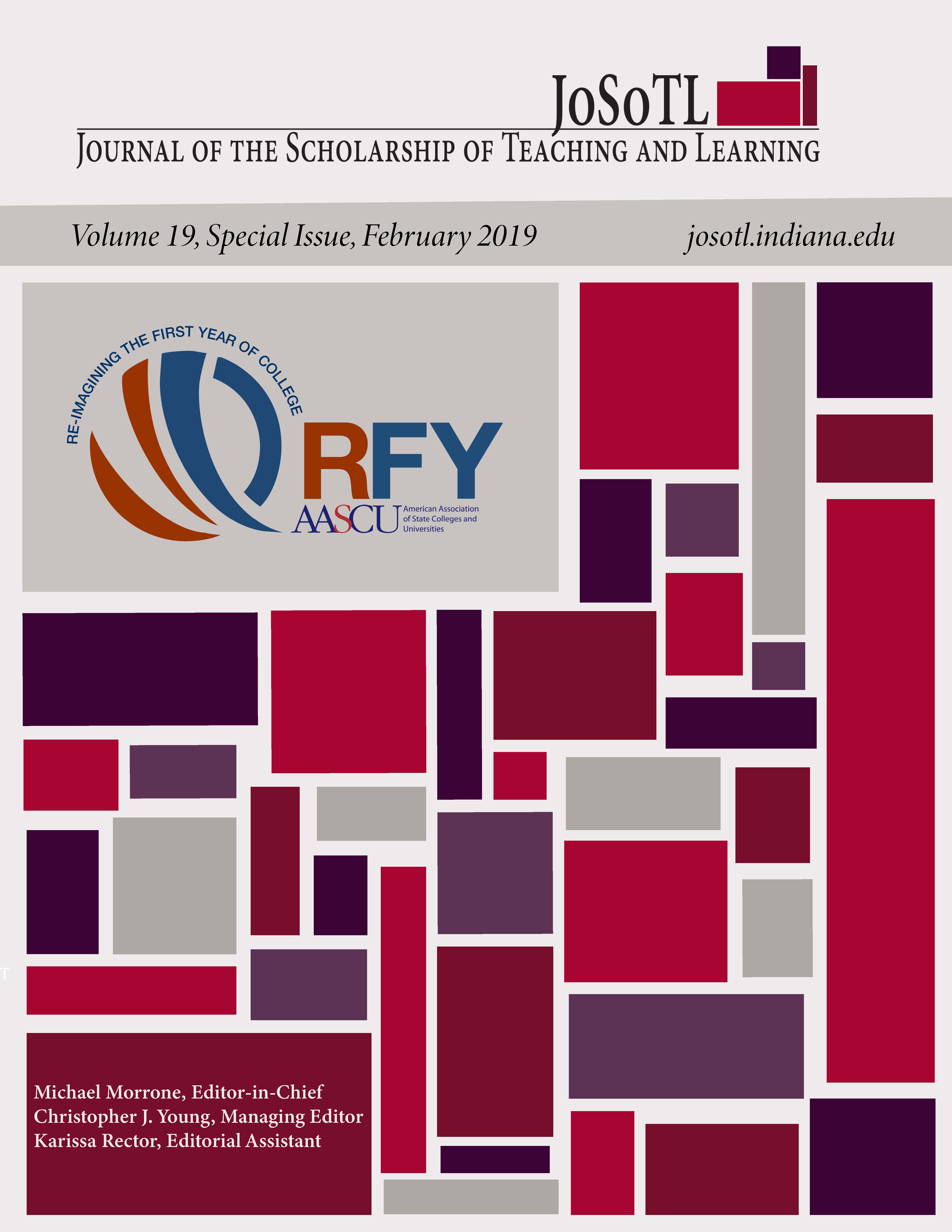Increasing Student Success through a Cocktail of Cognitive Interventions
Main Article Content
Abstract
We extended a series of interventions developed in modern cognitive psychology to a group of students who had been academically dismissed and were at high risk to not complete college. Students learned how to respond adaptively to academic failure, how to embrace challenge, how to set realistic goals, and how to persist until their goals are achieved. The interventions were delivered within a sophomore seminar course. Within the class, students learned about, considered and practiced aspects of growth mindset, goal orientation, grit, stereotype threat, and belongingness. Before beginning the class, the 68 students had a mean cumulative GPA of 1.45, a course completion rate of 60%, and it was expected that over half would drop out of college within the next year. Following the intervention, students earned a mean semester GPA of 2.39, a course completion rate of 73%, 72% were retained for the next semester, and 58% were still enrolled one year later. These findings provide support for the benefits of these techniques used together to afford student success in a population of students that have previously struggled academically.
Downloads
Article Details
- Authors retain copyright and grant the Journal of the Scholarship of Teaching and Learning (JoSoTL) right of first publication with the work simultaneously licensed under a Creative Commons Attribution License, (CC-BY) 4.0 International, allowing others to share the work with proper acknowledgement and citation of the work's authorship and initial publication in the Journal of the Scholarship of Teaching and Learning.
- Authors are able to enter separate, additional contractual agreements for the non-exclusive distribution of the journal's published version of the work (e.g., post it to an institutional repository or publish it in a book), with an acknowledgement of its initial publication in the Journal of the Scholarship of Teaching and Learning.
- In pursuit of manuscripts of the highest quality, multiple opportunities for mentoring, and greater reach and citation of JoSoTL publications, JoSoTL encourages authors to share their drafts to seek feedback from relevant communities unless the manuscript is already under review or in the publication queue after being accepted. In other words, to be eligible for publication in JoSoTL, manuscripts should not be shared publicly (e.g., online), while under review (after being initially submitted, or after being revised and resubmitted for reconsideration), or upon notice of acceptance and before publication. Once published, authors are strongly encouraged to share the published version widely, with an acknowledgement of its initial publication in the Journal of the Scholarship of Teaching and Learning.
References
Aronson, J., Fried, C.B., & Good, C. (2002). Reducing the effects of stereotype threat on African American college students by shaping theories of intelligence. Journal of Experimental Social Psychology. 38 (2): 113–125. http://doi:10.1006/jesp.2001.1491. ISSN 0022-1031.
Burnette, J. L., O'Boyle, E. H., VanEpps, E. M., Pollack, J. M., & Finkel, E. J. (2013). Mind-sets matter: A meta-analytic review of implicit theories and self-regulation. Psychological Bulletin, 139(3), 655-701.
Cohen, G. L. &Garcia, J. (2008). Identity, belonging, and achievement: A model, interventions, implications. Current Directions in Psychological Science. 17 (6): 365– 369. http://doi:10.1111/j.1467-8721.2008.00607.x. ISSN 0963-7214.
Duckworth, A.L., Peterson, C., Matthews, M..D., & Kelly, D.R. (2007). Grit: Perseverance and passion for long-term goals. Journal of Personality and Social Psychology. 92 (6): 1087– 1101. http://doi:10.1037/0022-3514.92.6.1087. PMID 17547490.
Dweck, C. (2006). Mindset. New York: Random House.
Dweck, C.S. & Leggett, E.L. (1988) A Social-cognitive approach to motivation and personality. Psychological Review, 95, 256-273. http://dx.doi.org/ 10.1037/0033-295X.95.2.256
Elliot, A. J. (1999). Approach and avoidance motivation and achievement goals. Educational Psychologist, 34(3), 169-189.
Gifford, D. D., Briceno-Perriott, J., Mianzo, F. (2006). Locus of control: Academic achievement and retention in a sample of university first-year students. Journal of College Admission, 191, 18-25.
Hatch, T. (2005). Into the Classroom: Developing the Scholarship of Teaching and Learning. Indianapolis: Jossey-Bass, An Imprint of Wiley.
Hoyert, M.S., O’Dell, C.D., & Hendrickson, K.A. (2012). Using goal orientation to enhance college retention and graduation rates. Psychology Learning and Teaching, 11, 171-179.
Hurtado, S. & Carter, D. F. (1997). Effects of college transition and perceptions of the campus racial climate on Latino college students' sense of belonging. Sociology of Education. 70(4): 324-345. doi: 10.2307/2673270.
Johns, M., Schmader, T., & Martens, A. (2005). Knowing is half the battle: teaching stereotype threat as a means of improving women's math performance. Psychological Science. 16 (3): 175– 9. http://doi:10.1111/j.0956-7976.2005.00799.x.
Koch, S., Muller, S., & Sieverding, M. (2008). Women and computers. Effects of stereotype threat on attribution of failure. Computers & Education. 51 (4): 1795–1803. http://doi:10.1016/ j.compedu.2008.05.007. ISSN 0360-1315.
McBride, L. & Kanekar, A. (2015). The scholarship of teaching and learning: Origin, development, and implications for pedagogy in health promotion. The Scholarship of Teaching and Learning, 1(1) 8–14.
Pascarella, E. T. & Terenzini, P. T. (2005). How college affects students: A third decade of research. San Francisco, CA: Jossey-Bass.
Strayhorn, T. L. (2012). College students’ sense of belonging: A key to educational success for all students. New York: Routledge.
Stewart, S, Lim, D. H, & Kim, J. (2015). Factors influencing college persistence for first-time students. Journal of Developmental Education, 38, 12-20.
Walton, G. M., & Cohen, G. L. (2007). A question of belonging: race, social fit, and achievement. Journal of Personality and Social Psychology. 92 (1): 82–96. http://10.1037/ 0022-3514.92.1.82
